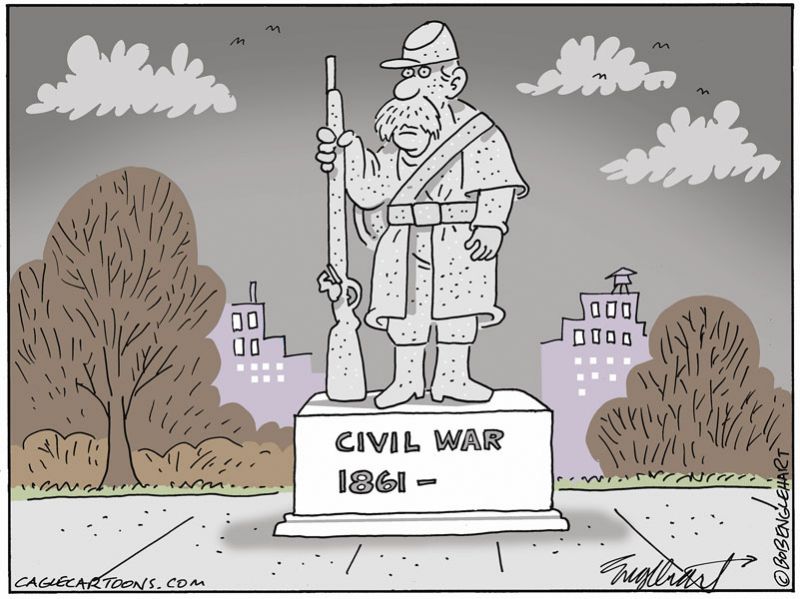Meador: Removing monuments erases the false glory, not the history
I was doing a crossword puzzle the other day, a pastime I’ve enjoyed since I was a teenager.
I am accustomed to seeing filler clues, those very common sequences of letters occurring in many crosswords that fill the squares between the difficult sequences. But the other day, one innocuous and very common filler made me think.
The clue read: “Gen. Robt. _ ___.” The answer was four letters and I knew right away the solution was “ELEE” or more accurately “E. Lee,” as in Gen. Robert E. Lee.
For his role in our nation’s Civil War, Lee holds a prominent place in history books, military lore and even crossword puzzles. He also has dozens of public statues and memorials honoring him.
The problem with that last bit is straightforward: Those who fought for a faction whose overarching issue was one of the all-time great human evils do not get honored with handsome public commemorations. Put more bluntly, those who fought a losing battle on the side of evil don’t get statues.
I avoid evoking the Nazis in comparison to anything, because such comparisons are usually enormously lopsided and totally inappropriate. But in this situation, I believe a careful comparison can be both appropriate and accurate.
One group of people violently subjugated another, the first absolutely certain of its superiority and moral right to dominate. The second group was deemed sub-human, and that was codified and quantified into law by governments.
There's no denying it. Americans legally bought and sold human beings for forced labor.
The thought of this moral poverty is intellectually repulsive and physically sickening to me. And those who took arms to preserve this evil deserve no public honor. Their valor in battle was erased by the wickedness they sought to perpetuate.
With the Allied victory in Europe, nearly every symbol of the vile Third Reich was eradicated. Indeed, even displaying a swastika became — and remains — illegal.
But today, Gen. Robert E. Lee, leader of the Confederate forces, holds the reputation of a Southern gentleman, a man graced with intelligence and humor, someone you’d want to have to Sunday dinner.
By many accounts, Field Marshal Erwin Rommel was also a good man, a man of character who eschewed politics. But both Lee and Rommel consciously and voluntarily fought for empires founded on the commission of unspeakable malevolence. And other than a tomb-like limestone block in his hometown of Heidenheim, a simple natural stone marking the spot on which he committed suicide in Herrlingen, you will not find monuments to Rommel in Germany.
The reason should be obvious. Why, then, is the South littered with glorious memorials to Lee?
To those fond of the oft-repeated refrain “but it’s part of our history,” I reply. You’re right, but no other free western society honors the promulgators of evil with monuments and statues.
If you still have doubts, they should be cleared up when you consider how many of the South's Confederate memorials were erected as contemptuous rejoinders to Black people during the Jim Crow era.
Don’t fret. Lee will remain a part of our history whether or not we have statues peppering the public squares of the southern U.S.
A friend pointed out to me that Lee agonized over the impending split of the country, and declined President Abraham Lincoln's offer of Union Army command and only after great inner turmoil.
I appreciate the legitimate complexity this lends to the man. But in the end, he made the wrong choice, and he sacrificed his honor for that decision.
While scholars still argue over the root causes of the Civil War, one area of general agreement is that the awful question of slavery was the single-most important causitive factor in the fracture of the nation.
Around 1,700 public nods to the Confederacy currently remain, nearly all located in Southern states. More than 700 are statues or monuments. As a result of the racial unrest of the last few years, around 100 of them have been removed.\
I believe many, many more need to come down. They never should have been raised in the first place.
Most could find homes in private gardens or museums, where they can be viewed in a context demanding no public support. A few could probably be allowed to remain as long as they were contextualized to tell the entire story, not just one falsely romanticized side.
If you’re one of those people who feel you have a vested interest in keeping these relics to one of the worst collective acts Americans ever committed, consider that many of your fellow Americans are morally repulsed by what they represent. Further, many Americans with brown skin consider these hateful monuments a direct affront to their ancestors, who often died at the hand of the evil being commemorated.
I held out hope that the one good thing to come out of the prolonged violence in Portland would be a meaningful, ongoing dialogue aimed at bringing healing between the races. But we seem to have stalled again.
As we honor Dr. Martin Luther King Jr. this month, and focus on Black history next month, please do more than cursory actions like watching a couple of television shows on the civil rights movement or vacantly telling your friends you’re color-blind. We’ve never completed the reckoning that should’ve taken place after slaves were freed or, failing that, after the civil rights movement began to foster grudging change. In a significant way, our spiritual growth as a nation is stunted by our failure to examine our own prejudices with humility and honesty.
Please don’t get me wrong. I'm not making a sweeping condemnation of white people or disrespecting this great country. But in all our nationalist enthusiasm over two hundred years, I believe we sometimes forget we must own several national shames.
The worst of these was slavery. That being the case, removal of some one-sided statues is a very small price to pay to begin desperately needed racial healing.














Comments